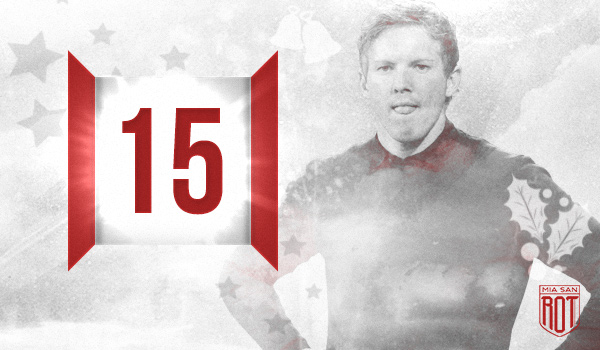The MSR advent calendar: Our favorite signings that never happened: Door 15 – Julian Nagelsmann
In late summer 2017, the Bayern bosses pulled the plug: Carlo Ancelotti, who had succeeded Pep Guardiola just over a year earlier, was sacked after a 3-0 defeat at Paris Saint-Germain in the Champions League group stage. A very protracted discussion ensued about what would happen next – a discussion to which the public became witness.
The main protagonists: Karl-Heinz Rummenigge and Uli Hoeneß. In the middle of it all: The newly appointed sporting director Hasan Salihamidžić. Soon after Ancelotti’s dismissal it became clear that Willy Sagnol, Ancelotti’s former assistant who had taken over the team in the meantime, would not be a medium-term or even short-term solution. Instead, the bosses were feverishly looking for a new coach in autumn. And quality coaches in autumn is usually a good in short supply.
But there were two candidates who would very probably have been available: Arsène Wenger and Thomas Tuchel. Rummenigge and Salihamidžić in particular were said to have been strongly in favor of bringing Tuchel to Munich. Hoeneß, however, refused.
The situation at FC Bayern
Because continuing with Sagnol was out of the question and a permanent replacement hard to find, the bosses eventually agreed on a different stopgap solution: Hoeneß managed to reactivate Jupp Heynckes and thus buy the club time until the summer. Heynckes brought the season to a successful conclusion and then came … Niko Kovač.
It was a big surprise. Kovač had been successful with Eintracht Frankfurt, no doubt, but there were also many things that spoke against him. His football was not characterised by the kind of offensive drive and suffocating dominance that was seen as the essence of FC Bayern. In addition, his end with the Croatian national team gave cause for concern.
What made the decision for Kovač most questionable, however, was the way he got there. Between autumn 2017 and summer 2018, not only many days and months went by, but also many rumours and candidates. Tuchel at some point decided against Bayern himself, Wenger wondered about the recruiting process being carried out so much in the open, and another hotly traded candidate decided in summer 2018 for RB Leipzig: Julian Nagelsmann. He has been head coach there since last season.
The situation with the coach
Just a year before, Nagelsmann had yet sent unmistakable signals to Munich that went far beyond wearing a red coat when he said, obviously being in a flirting mood: “FC Bayern would perhaps make me a bit happier.”
Without question, it would have been a big risk to bring Nagelsmann in at what was regarded such an early point in his career (although he already had had over ten years of coaching experience at the time). How would he deal with the stars and big egos at FC Bayern who had managed to push even an experienced veteran coach and supposed man-manager like Carlo Ancelotti to his limit?
Probably with professional competence. The mistaken belief that after Guardiola there needed to be a phase of relaxation and “removing the shackles” for the team to recover from the grueling intensity of the Spaniard led to the debacle in Paris. Nagelsmann would have picked up where Guardiola had left off and challenged the team on the training pitch and at the tactics board in the way it needed.
Would Nagelsmann have ushered in a new era?
Moreover, Nagelsmann stands for a modern style: high tempo, high intensity, flexible shape, a lot of aggressiveness. With him, the club could perhaps have started a new era. The Bayern bosses would probably have had to show patience with him. But Nagelsmann proved at TSG Hoffenheim that he can make individual players better by building a tactical framework around the players that suits them.
Players like Kevin Vogt never worked as well as they did under the young coach. Hiring him would undoubtedly have been a courageous move on Bayern’s part. But it would have been more consistent and more in line with the club’s philosophy than the decision in favour of Kovač, which was the result of a long dispute between the club’s bosses.
And yet, from today’s perspective, it must be qualified that it was a good decision for Nagelsmann personally to go to Leipzig. There he had more pressure than before, but considerably less than he would have had at Bayern. His stint at Leipzig can be seen as a preparatory step before joining a real top club due to its heightened but not overwhelming pressure levels, which will probably benefit him both as a coach and a person.
Bayern might not have won the treble under him. The fact that it went from Kovač to Flick is a dramatic twist in the tale that makes it easier to look past the missed opportunity in 2018. And for Nagelsmann, the path may still lead to FC Bayern at some point.
Note on the next door: Tomorrow we go back to the players. In 2009, the signing of Arjen Robben was the coup of the century, but there was another Madrid player, too, who was sidelined at Real and could have strengthened Bayern.





